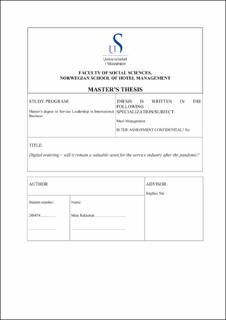| dc.description.abstract | The purpose of this thesis was to explore how QR-codes have affected both guest experiences, and how it affects daily operations in the service industry. The Five Aspect Meal Model (Gustafsson et al., 2006) was reviewed in-depth, supported by other scholars (Hansen et al., 2005), to understand elements that influences guest experiences. An exploratory research design was considered the right approach, and the primary data was collected through semi-structured interviews with twelve informants working in the service industry in Stavanger. Additionally, insight from one of Norway’s largest companies that provides digital solutions to the service industry was given to the author, which included a professional research towards guests’ experiences and opinions on the use of QR-codes.
The data was thematically analyzed, using the Five Aspect Meal Model to structure the interview guide and the findings. The data analysis showed that the aspects related to interactions (The Meeting) and managerial tasks (The Management Control System) were the most affected by the digital change. Further, it was found that the service establishment’s concept and venue capacity were factors which significantly affected the informants’ experiences. Larger places that usually provides table-service should be able to increase efficiency and reduce labor costs with digital service, especially if the products sold are commonly known and the need of staff’s attention is low. Contrary, the thesis concludes that smaller establishments focused on personal interactions were more negative towards QR-codes as it decreased the value of their total offering.
Lastly, the thesis concludes that QR-codes will remain a part of the service industry, but not at the levels experienced during the pandemic. Restauranters and bar managers are optimistic about digital transformation, but it needs to fit the establishment’s concept. | |
